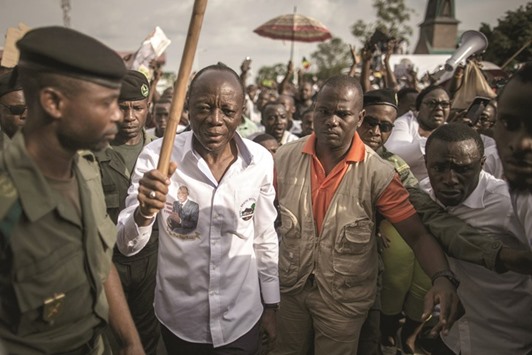Congo Republic’s government has ordered the country’s two largest telecommunications providers to block all communication during a presidential election today for security reasons, a government source said yesterday.
The decision will cause inconvenience and possible alarm in a country where many rely on cell phone communication and a prominent government critic said it would impede the work of election monitors.
President Denis Sassou Nguesso is expected to extend his long rule in the oil-producing nation by defeating eight opponents, including retired General Jean-Marie Mokoko who is seen as the strongest challenger.
Mokoko was summoned yesterday to the state security headquarters as part of an ongoing security investigation, Charles Zacharie Bowao, the president of the opposition coalition that Mokoko belongs to, told Reuters.
“The minister of the interior indeed signed and sent a letter to ... MTN Congo and Airtel Congo to tell them that the state wants them to cut off communication on March 20 and 21 for reasons of security and public tranquillity,” the government source told Reuters.
The move to block communications is unusual in the context of an election in Africa, though Uganda shut down Twitter, Facebook and WhatsApp on the day of its presidential election in February.
“(The decision is bad because) there are other things to think about besides elections. Everything is being done so that the election is not transparent,” said Joe Washington, president of the Ebina Foundation, an activist group.
Sassou Nguesso has led Congo for 32 of the last 37 years and pushed through constitutional changes last October to remove term and age limits that would have prevented him from standing again.
Soldiers accused of attacking civilians
Soldiers in Democratic Republic of Congo’s army have taken part in at least three deadly attacks on civilians and turned a blind eye to other assaults carried out by rebels, a former UN investigator said in a report released over the weekend.
Spokesmen for Congo’s government and army did not immediately respond to requests for comment on the allegations by the Congo Research Group at New York University, headed by Jason Stearns.
More than 500 people have died in a wave of machete attacks and other raids in Congo’s east since October 2014, rights groups say.
The government has blamed most of them on the Allied Democratic Forces (ADF), a Ugandan Islamist group that has operated in eastern Congo since the 1990s.
But Stearns said witnesses and other evidence showed soldiers had participated in at least three attacks near the town of Beni between October 2014 and March 2015.
“We have collected matching testimonies on the involvement of (army) soldiers in certain massacres and also several general testimonies of (army) officers that confirm this complicity,” the report said.
The soldiers’ motives were not clear, the report added, but it said there was evidence of past collaboration between army officers and the ADF in timber trafficking. Ethnic rivalries could also be involved in some cases, it said.
Two colonels were convicted by a military court in November 2014 in connection with the assassination of the commander of operations against the ADF near Beni earlier that year.
Millions died between 1996 and 2003 in regional conflicts in Congo’s east, mostly from hunger and disease. Dozens of armed groups continue to prey upon the local population and exploit the area’s natural resources. The report said the repeated failure by army units, sometimes stationed close to the attack, to respond promptly suggested some officers had given orders not to intervene.
The failure to respond to attacks was noted by a parliamentary mission report in November 2014 and a report by the current UN panel of experts in Congo last year.
“If you ask questions to understand why, they whip you,” one non-commissioned officer told researchers about orders not to intervene.
Stearns is a former coordinator of the UN panel of experts in Congo.

Congolese presidential candidate Jean-Marie Michel Mokoko arrives at his closing rally in Brazzaville late on Friday.
